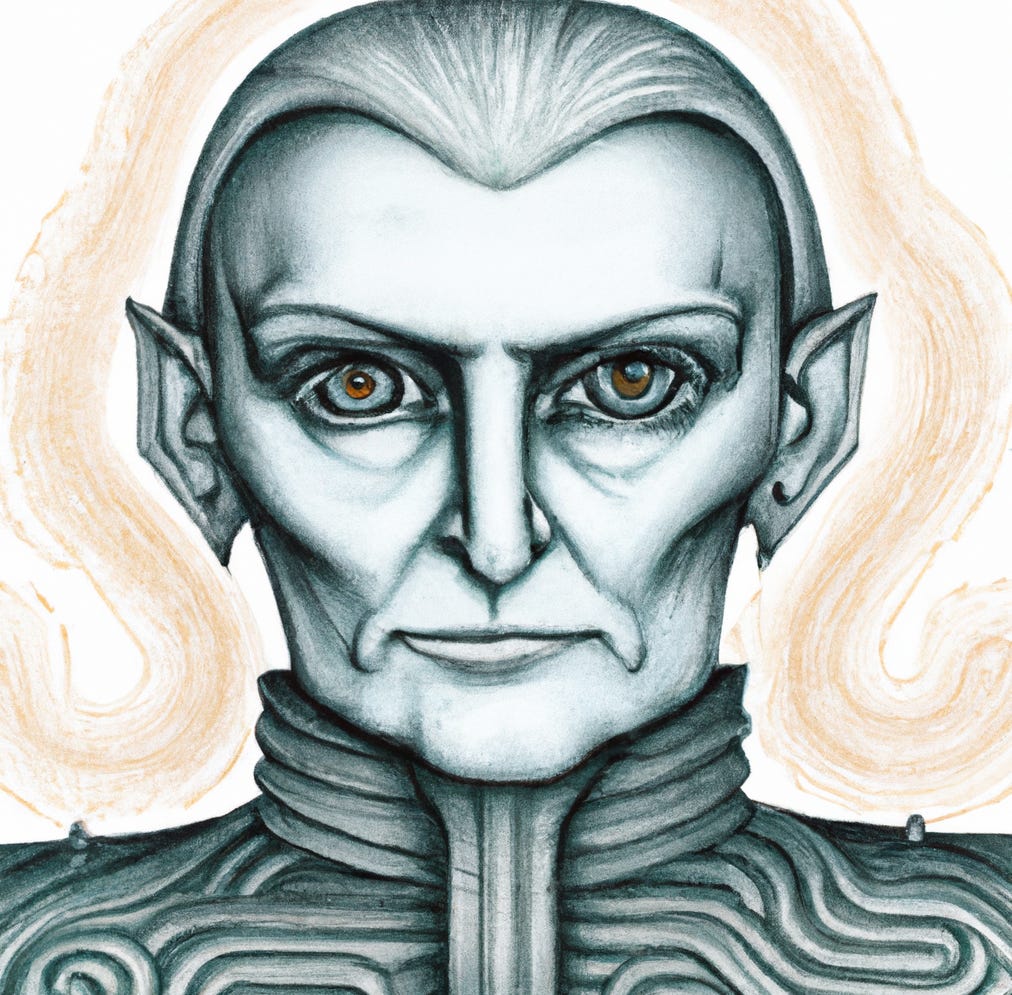Friend and fellow Substack writer Yago posted a passage from Nietzsche the other day:
https://twitter.com/ProjectImpero/status/1654077999828828166
It seems Substack no longer allows me to embed these tweets as before… but you should go follow Yago on there if you have blue bird app, and follow his writing on Substack too.
He shares interesting thoughts on all sorts of things essential to living a good life such as philosophy, the dietary philosophy of Ray Peat, and drinking 40 liters of milk a week.
The fragment Yago shared is from Beyond Good And Evil, the section “On the Prejudices of Philosophers.” It is very funny, Nietzsche’s famous critique of Kant. Somewhere else, Nietzsche says that a hammer can never know its own limits. What is needed is an object for which the hammer is too weak and that breaks the hammer. Only then does the hammer really know what is and what isn’t in its power. And so, a faculty can not know its own limits, and reason can not know its own limits. This is what Nietzsche brings in against the Kantian project of reason critiquing itself.
A certain ‘opening’ occurs, faculties are no longer seen as self-contained wholes, but as things deeply influenced and moulded by the world and all the things that affect ‘them’. Although Nietzsche, the aphorist, seems to just dismiss Kant without further ado, there are a lot of implications in these critiques. Many later philosophers will be inspired to write a new ‘critique of pure reason’, but incorporating the genesis of a faculty out of the environment. I think of Maimon, Deleuze later. Now of course as always with Nietzsche, these fragments are dangerous, one would be led to think that there is no reason in actually reading Kant. Which would be a bad conclusion to make, unless you have better things to do than reading of course. But if this is the case, you would probably be better off spending the precious time you don’t have by reading Kant, instead of reading this blogpost. You should also realize that Nietzsche himself was extremely well read when it comes to the Kantian philosophy. I am sure he saw great power in Kant, and these short aphoristic critiques, they are the result of a deep interest and engagement. So please, be a Kant respecter.
Look, I asked one of these AI image robots to make a portrait of Kant in the style of H.R. Giger:
Artificial Infant, yes.
Something I find most interesting when it comes to this relation Kant - Nietzsche is the topic of ‘Ideas’. Nietzsche sort of critiques Kant’s Ideas of Reason, but I have a hard time understanding what Nietzsche thinks about the topic himself without first looking at Kant’s understanding of it. Ideas, with Plato one could say, they are seen as these objective things. Self-contained and self-identical wholes outside of us that act as both the ground and the end for our actions. The Idea of Beauty makes us search for beauty, in the double sense that Beauty drives us on to search for Beauty. Both ground and end. With Kant, the Ideas cease being these things outside of us and become ‘properties’ of pure reason. And as Ideas of Reason, they act as these driving forces that make us act and think and so on. The deep driving forces of our thoughts and actions. Reason sets the ends and acts as the ground, the understanding seeks to achieve this end and claim the ground.
Note: whether or not with Platonism Ideas are these objective things outside of us is dubitable, but at least it allows me to make a point.
Now Nietzsche’s problem here is that he sees a certain weakness in wanting Ideas to be given, either objectively, or by something as impersonal as ‘pure reason’. It betrays a certain weakness of will, wanting one’s deepest motivations and ends to be given by something outside of oneself. And even more, having this finite number of pre-determined Ideas.
Can you not will for yourself? Is your own life not enough of a driving force? So with Nietzsche again a certain opening takes place, not just a finite number of the same Ideas given to each and everyone. No, YOUR Ideas, the Ideas or driving forces that drive YOU. And not every type of life is driven by the same things, evidently. A life is judged on the basis of the degree to which it approaches ‘Ideas’, but who is the judge as according to what these Ideas must be? This is the question. And the real power is not in following some abstract ideas given by a philosopher, but in rising up to the level of development where one is able to make this choice for oneself, where one becomes the lawgiver oneself. All the greatest philosophers were able to rise to this level, they become lawgivers for Man, not just offering knowledge to mankind for the understanding to digest, but setting ends for Man, deciding what is most worth investigating, what mode of life is most worth living, and so on. All great philosophies, religions, and so on, are about Ideas in this sense.
In his Paideia, Werner Jaeger writes:
“The only science which is valuable is the science of choice, which enables us to make the right decision. […] The greatest danger for each of us is that he may choose the wrong life — or, as the philosopher would explain it, the wrong pattern of life, the wrong ideal.” (Jaeger, Paideia, II)
Even if you don’t have much faith in the writing of someone like Plato or Kant, even if you consider yourself too smart for all of this, the topic of ‘Ideas’ can never be considered old-fashioned. What drives us? What drives different types of life? And what should drive us? These are the questions to which the concept of ‘Idea’ relates. And Nietzsche’s criticism of these concepts, it is only to remind us of the original questions to which these concepts refer. Questions which are not just the abstract ravings of a mind without a body, but which are born from real life. Before someone starts thinking about the ‘Idea’ that would make courageous action possible, men were acting courageously. And before people raise their heads up to the sky, looking for the Divine, God speaks directly to man. Nietzsche says somewhere he detested the new testament, but enjoyed the old one very much. Of course this has to do with the entire slave & master morality thing, and the critique of asceticism and so on. But perhaps more importantly, it has to do with this:
Nietzsche is not interested in people being led to ‘believe’ in a God because some charismatic guy tells them to, he is not interested in people pointing their eyes away from the world and towards ‘God.’ He is interested in God speaking to man, directly, and not just with some abstract message of universal love or something, but with concrete instructions: do this, conquer this land, save and create this people. He is interested in this moment where one’s ears open up to the divine and the voice of God is heard commanding one what one must do with one’s life: become the lawgiver enacting divine law, correcting the wrongs of this world so that it might be more in accordance with the Ideal, make an end to this type of life and create a new form of life. “What are the Ideals I must follow and how can I follow them?” Nietzsche is not interested in this question, rather, he asks: how can man achieve this state of mind and body where Nature uses him to set new Ideals and goals for mankind, and gives him the will to enforce them. It is all about the same thing, but from a different perspective, seen from the perspectives of different lives.
All of this is what the topic of ‘Ideas’ is about, and Nietzsche is not interested in the psychology of the follower of abstract ideas written out by others. He is interested in the lawgiver, the one actually driven by Ideas, not out of choice, but out of necessity. That is, he is interested in the genesis of Ideas by someone capable of being in touch with these driving forces that are so much deeper than the usual motives of everyday. He is not interested in what happens when, no longer actually in touch with these forces through one’s own experience, we start worshipping abstract tables of ‘ideas’.
But Kant is important, very much so. More than anyone else he is responsible for re-establishing the essence of what Ideas really are; these deep driving forces, subterranean, driving us onward to think and act to ever greater degrees. Not just some abstract Ideas floating in the sky. Hence, Kant characterizes them as ‘problems’. They are Problems that drive us on to seek for a solution through understanding and action. But again, who is more of an interesting type of life to study, the child that seeks solutions for the problems given by the teacher, or the thinker who is able to set his own problems, to ask his own questions.
Some people have said that in this sense the Platonic Idea is already evidence of a decline in comparison to pre-Platonic Greek man. The heroes in Homer, they do not need to think about the ‘Idea’ of Courage so as to judge themselves to see if they are acting in accordance with the Idea(l) and where they can do better. NO, driven on by the Gods they actually act courageously, and that is all there is to it, it is in their nature. How, in this closeness of experience, actually living it, could the Idea ever become something abstract, objective, and distanced from the individual, for him to contemplate?






Wonderful post my friend. It's an honor to be a part of it!
Your comments made me think of Nietzsche's passage in Ecce Homo:
"Retaining only the smallest remnant of superstition, one can still hardly reject the idea of being a mere incarnation, a mere mouthpiece, a mere medium. […] Everything happens involuntarily in the highest degree, yet in a tempestuous feeling of freedom, of being unconditioned, of power, of divinity.”